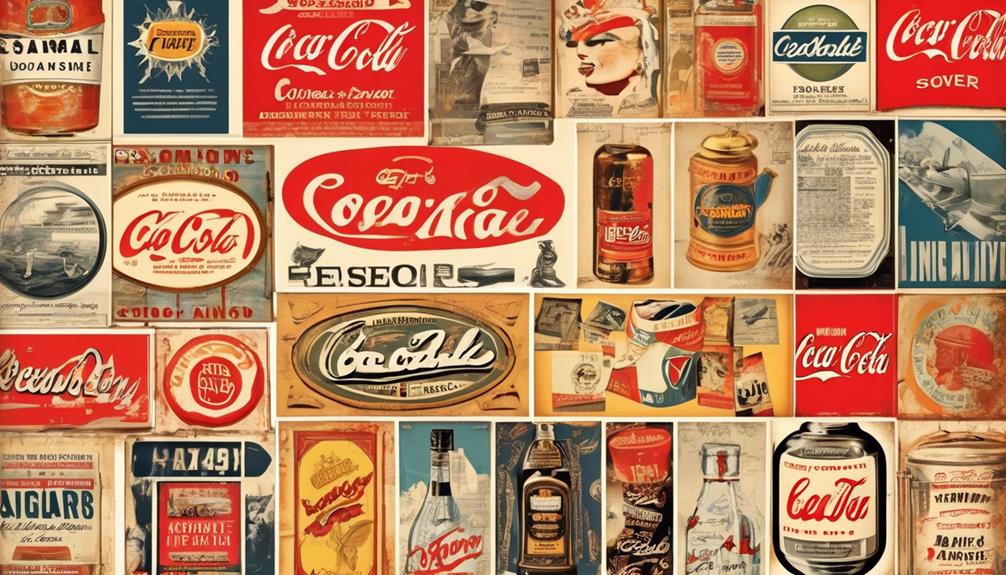Famous taglines become legendary quotes by tapping into your emotions, shaping cultural identities, and remaining simple enough to remember. As they connect with your values or sense of humor, they transcend advertising to become part of everyday life. Slogans like “Just Do It” or “Yes We Can” inspire action and hope, turning into symbols of movement and mindset. To discover how these phrases achieve such lasting impact, keep exploring their fascinating journey.
Key Takeaways
- Effective taglines evoke strong emotions and tell compelling stories, making them memorable and transforming them into legendary quotes.
- Simplicity, linguistic cleverness, and cultural relevance help slogans resonate across generations and social contexts.
- Strategic branding and authentic messaging foster deep emotional connections, elevating slogans into symbols of motivation and societal values.
- Viral spread and social media amplification turn taglines into collective rallying cries and cultural icons.
- When combined with visual storytelling and humor, slogans transcend advertising, inspiring art, discourse, and lasting cultural impact.
The Origins of Memorable Advertising Phrases
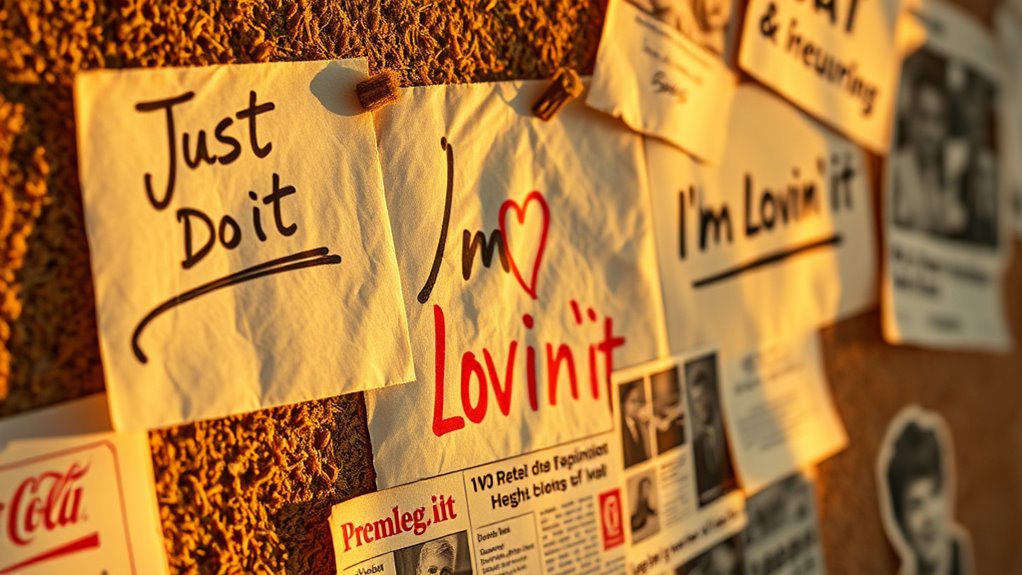
Have you ever wondered how some advertising slogans become instantly recognizable? It all begins with effective brand storytelling that resonates deeply with your emotions and experiences. Marketers tap into consumer psychology, understanding what motivates you and what values you hold dear. They craft phrases that do more than just promote a product; they create a narrative that aligns with your identity. When a slogan tells a compelling story or evokes a strong feeling, it sticks in your mind. These words are designed to forge an emotional connection, making the message memorable and shareable. Over time, this strategic use of storytelling and psychology transforms simple phrases into legendary quotes, embedding themselves into culture and everyday life. Visionary quotes can also serve as powerful tools to inspire this kind of emotional resonance, turning advertising phrases into life-changing words.
From Commercials to Cultural Icons: The Journey of “Just Do It”
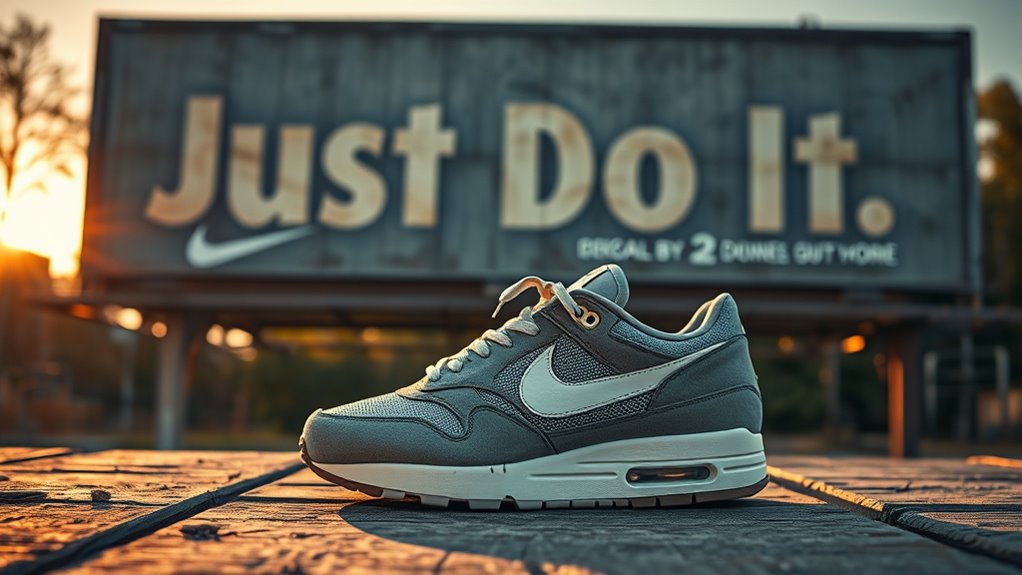
Nike’s “Just Do It” slogan transformed from a simple advertisement phrase into a powerful symbol of motivation. Its evolution reflects how branding can shape cultural values and inspire millions worldwide. Let’s explore how this tagline became a lasting cultural icon and impacted Nike’s identity. The phrase’s enduring appeal is partly due to its ability to convey a sense of motivation and action, resonating deeply with diverse audiences.
Nike’s Branding Evolution
The journey of “Just Do It” showcases how a simple slogan evolved into a powerful cultural symbol. Over time, Nike’s branding evolved from basic advertising to a strong brand identity that resonates globally. The slogan’s authenticity and motivational tone helped forge a deep connection with consumers, fostering loyalty that goes beyond products. By consistently aligning its messaging with values like determination and perseverance, Nike transformed its brand into more than just athletic gear—it became part of personal identity. This evolution allowed Nike to stand out in a crowded marketplace, creating a sense of community among followers. As a result, the brand’s strategic use of its slogan reinforced consumer loyalty, making “Just Do It” a symbol of inspiration and a cornerstone of Nike’s ongoing branding success. Additionally, Nike’s ability to adapt its message to cultural shifts and social issues has further solidified its brand identity as a leader in both sports and lifestyle markets.
Cultural Impact of Slogans
How did a simple slogan like “Just Do It” transcend advertising to become a cultural icon? It’s because it tapped into societal shifts, inspiring a sense of determination beyond sports. The phrase’s linguistic influence made it easy to adopt in everyday conversations, shaping attitudes about perseverance and motivation. As society evolved, “Just Do It” became more than a marketing catchphrase; it reflected a collective mindset that values action and resilience. Its power lies in its simplicity and universality, allowing it to resonate across different cultures and generations. This transformation demonstrates how a well-crafted slogan can influence societal values, embed itself in popular culture, and inspire millions to take action—turning a commercial tagline into a lasting symbol of empowerment.
“Think Different” and the Rise of Inspirational Quotes

“Think Different” revolutionized advertising by transforming a simple slogan into a powerful call to action that inspires millions. Its success lies in its cultural resonance, capturing the spirit of innovation and individuality that many aspire to. The phrase’s linguistic simplicity makes it memorable and accessible, allowing it to transcend linguistic and cultural barriers. This clarity helps it become more than just an ad slogan; it becomes a rallying cry for creativity and non-conformity. Additionally, the phrase’s association with a brand known for supporting trendy dog sweaters and other lifestyle products underscores how branding can extend beyond products to influence cultural values. As a result, it sparked a rise in inspirational quotes that emphasize personal empowerment and bold thinking. You can see how a few carefully chosen words can shape perceptions, motivate change, and elevate a brand into a symbol of cultural movement. “Think Different” remains a prime example of how simplicity fuels profound impact.
The Power of Simplicity: “Have It Your Way” as a Personal Motto

When you adopt “Have It Your Way” as a personal motto, you’re embracing your right to make choices that reflect your true self. It’s a bold statement of independence that empowers you to prioritize your preferences. By doing so, you assert control over your life and demonstrate confidence in your decisions. This mindset encourages you to create your own home environment, making choices that foster comfort and authenticity.
Embracing Personal Choice
Choosing to prioritize your personal preferences empowers you to live authentically and confidently. When you embrace your choices, you reinforce your sense of personal empowerment and strengthen your ability to express yourself freely. By valuing individual expression, you create a life that reflects who you truly are, rather than conforming to external expectations. This mindset encourages you to make decisions that align with your values and desires, fostering a sense of independence. When you own your choices, you claim ownership over your journey, cultivating confidence and resilience. Remember, your ability to select paths that resonate with you is a crucial part of personal growth. Ultimately, embracing personal choice helps you build a life rooted in authenticity and self-trust.
A Statement of Independence
Have you ever considered how a simple phrase can embody your sense of independence? “Have It Your Way” serves as a powerful personal motto because it emphasizes the importance of making choices that reflect your true self. This phrase shapes your branding identity, showcasing your commitment to individuality. When you adopt this mindset, you influence consumer perception, signaling that your priorities center on personal freedom and authenticity. It’s a statement that communicates confidence and self-reliance without complication. By keeping it simple, you reinforce your independence and encourage others to do the same. Ultimately, this tagline transforms into a personal mantra, reminding you—and others—that true independence comes from making choices aligned with your values and desires. Recognizing how simple phrases can carry profound meaning helps you craft messages that resonate deeply with your personal and professional identity.
Humor and Wit: The Transformation of “Where’s the Beef?”
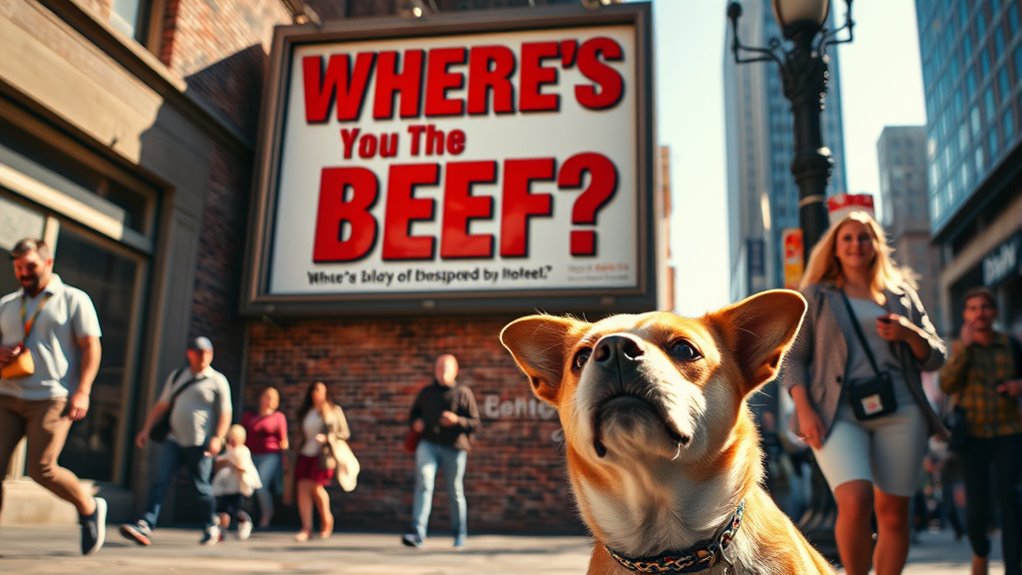
The phrase “Where’s the Beef?” became a cultural catchphrase by blending humor with sharp wit, capturing the public’s attention through a simple yet memorable question. Its success lies in how it tapped into pop culture, making it instantly recognizable and relatable. This phrase exemplifies marketing psychology, as it cleverly questioned quality in a humorous way, prompting consumers to think critically about products. The humor and wit transformed it from a mere advertising slogan into a rallying cry that resonated beyond commercials. Its cleverness helped it stick in people’s minds, sparking conversations and media references. By combining humor with insight, the phrase elevated a product critique into a legendary quote, showing how humor can powerfully shape cultural moments and perceptions. Additionally, the phrase’s playful tone echoes techniques used in humor and wit to create memorable messages that resonate widely.
Taglines That Spark Movements: “Yes We Can” and Political Discourse

“Yes We Can” exemplifies how a simple tagline can ignite social and political movements by inspiring hope and collective action. Its viral marketing spread quickly through social media, demonstrating the power of consumer psychology in shaping public discourse. When you see a slogan like this, it taps into your desire to participate in something bigger, fueling motivation and unity. The phrase’s emotional resonance encourages people to share and rally around a cause, turning it into a rallying cry that transcends politics. Its widespread adoption shows how effective messaging can harness the dynamics of viral marketing, making a simple statement into a symbol of hope and change. Additionally, the use of memorable and relatable slogans is a key strategy in Vetted – Startup Sofa branding and communication efforts, highlighting the importance of well-crafted taglines in social movements. This highlights how powerful taglines are in mobilizing communities and shaping political dialogue.
The Evolution of Brand Slogans Into Everyday Language
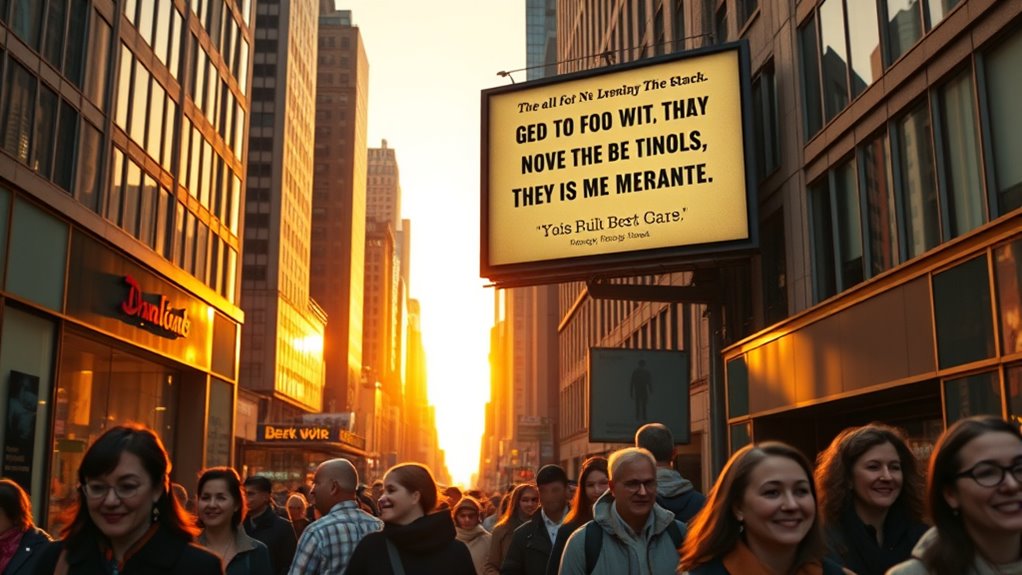
Many iconic slogans originally crafted for branding or political campaigns have become so ingrained in daily life that they now serve as common expressions. These slogans influence consumer psychology by reinforcing brand loyalty, making their phrases memorable beyond advertising. Over time, phrases like “Just Do It” or “Have It Your Way” extend beyond their original context, shaping how people communicate. They tap into emotional triggers, creating a sense of familiarity and trust that encourages loyalty. As these slogans evolve into everyday language, they shape perceptions and expectations, blurring the line between marketing and culture. You start to use these phrases naturally, often without realizing their commercial origins, which demonstrates how powerful branding can become in shaping language and societal norms. The famous taglines themselves often originate from strategic marketing campaigns designed to leave a lasting impression.
When Advertising Becomes Art: The Enduring Impact of Catchphrases
When a catchphrase captures the public’s imagination, it often transcends its advertising origins to become a piece of cultural art. You can see this through how these phrases leverage visual storytelling, creating vivid images that stick with you. They evoke emotional resonance, tapping into shared feelings or experiences that make them memorable. These slogans do more than sell products; they influence culture, inspiring art, humor, and conversation. By framing ideas simply yet powerfully, they become iconic symbols that endure over time. When advertising becomes art, it’s because these catchphrases connect on a deeper level, shaping perceptions and embedding themselves into everyday life. They prove that words, when paired with visual and emotional impact, can leave a lasting cultural legacy. Additionally, branding strategies play a crucial role in how these slogans are crafted to maximize their cultural influence.
Frequently Asked Questions
How Do Advertising Slogans Influence Popular Culture Beyond Marketing?
Advertising slogans influence popular culture by showcasing linguistic creativity that makes them memorable. You might find yourself quoting them in everyday conversations, illustrating cultural integration. These slogans often transcend marketing, shaping societal language and values. They become part of shared experiences, influencing humor, idioms, and even social norms. By doing so, slogans elevate brands to cultural symbols, demonstrating how marketing can leave a lasting imprint beyond commercial intent.
What Psychological Effects Do Memorable Taglines Have on Consumers?
Memorable taglines act like a catchy song stuck in your head, creating emotional resonance and cognitive impact. They shape your perceptions, making you feel connected or motivated without even realizing it. When a tagline strikes a chord, it influences your choices and attitudes subtly but powerfully. This psychological effect helps brands stay memorable, forging a lasting bond that nudges you toward loyalty or action long after you’ve seen or heard it.
Can a Tagline’s Success Depend on Its Timing and Societal Context?
Your tagline’s success indeed depends on its timing and societal influence. When you align your message with cultural timing, it resonates more deeply, capturing public attention precisely when societal values or trends support it. If your message fits current cultural moments, it’s more likely to become memorable and impactful. Conversely, ignoring societal influence can cause your tagline to miss its potential, making timing and societal context vital for legendary status.
How Do Brands Maintain Relevance of Their Slogans Over Decades?
Staying significant over decades demands diligent brand renewal and clever slogan evolution. You keep your campaign current by consistently customizing your message to meet changing consumer needs and cultural currents. Regularly revitalizing your slogans ensures they resonate anew, reinforcing brand relevance. By embracing innovation and infusing familiarity, you foster lasting loyalty, transforming simple slogans into legendary lingo that stands the test of time, truly making your message memorable and meaningful.
What Role Do Social Movements Play in Transforming Slogans Into Quotes?
Social movements profoundly impact how slogans become quotes by reflecting cultural shifts and social activism. When a slogan resonates with a movement’s ideals, it gains momentum and becomes more than just marketing; it turns into a rallying cry. You see this happen when people adopt these words to express shared values, transforming them into powerful quotes that inspire action and stay ingrained in society long after the campaign ends.
Conclusion
You’ve seen how iconic taglines become part of our daily lives, shaping culture and inspiring movements. Did you know that over 70% of consumers remember advertising slogans better than brand names? That shows just how powerful a simple phrase can be. So next time you hear a catchy quote, remember it’s more than just marketing—it’s a lasting legacy that influences how we think, feel, and act every day.

